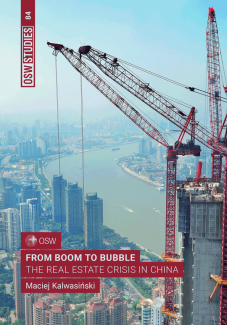From boom to bubble

The real estate boom has been the cornerstone of the ‘economic miracle’ that in recent decades has elevated China to the world’s second-largest economy and turned its metropolises into symbols of China’s development, global power and aspirations. Today, China boasts 5,000 years of history, yet few buildings in the country are more than 50 years old. However, after years of frenzied speculation, further expansion of this sector has clashed with the Chinese government’s overarching priority: preparation for the escalation of its conflict with the United States. Beijing’s aim is no longer to maximise GDP growth, but to modernise the economy to strengthen national security.
Decisions taken by the Chinese government in 2020 triggered the deepest and longest crisis in the country’s real estate market since its inception in the 1990s. Within three years, home sales in the primary market plunged by more than a half, construction starts fell by two-thirds, and property prices saw their steepest decline on record. Successive government interventions have failed to halt this slide. The situation has sparked understandable concern both at home and abroad, as in many countries problems in the real estate sector have often been the catalyst for economic crises.




